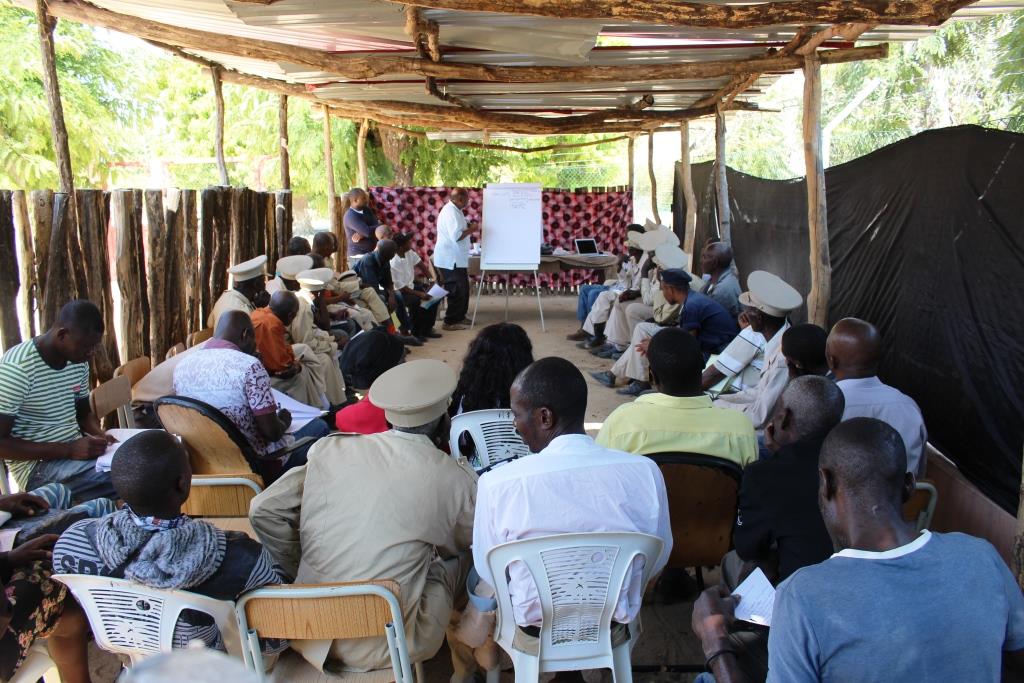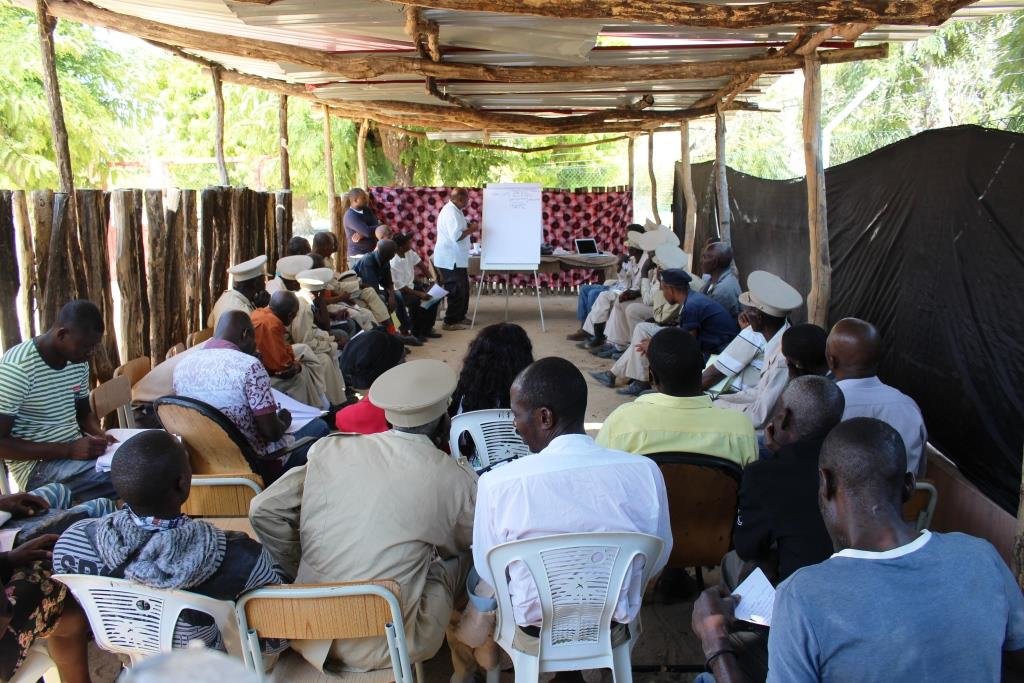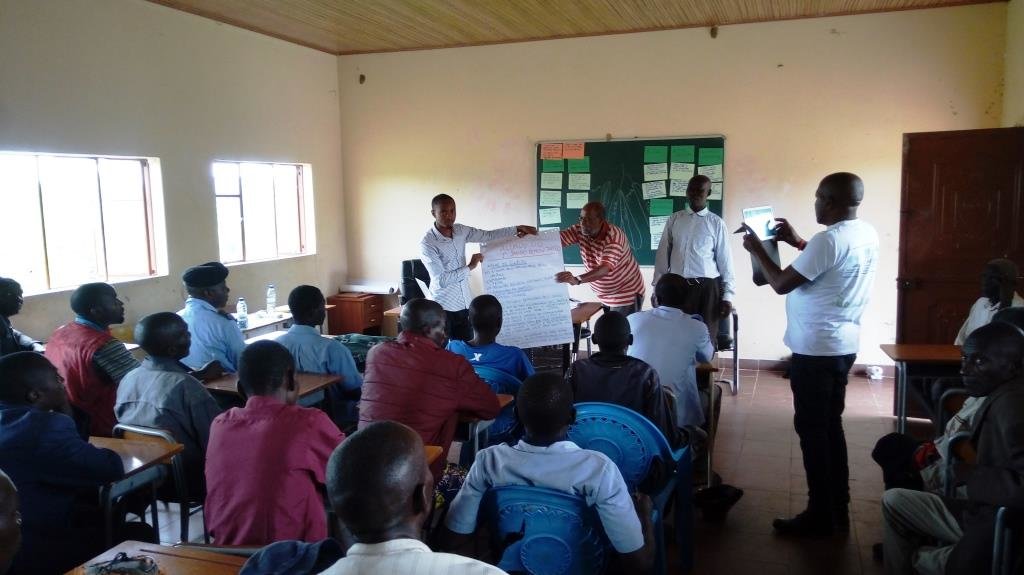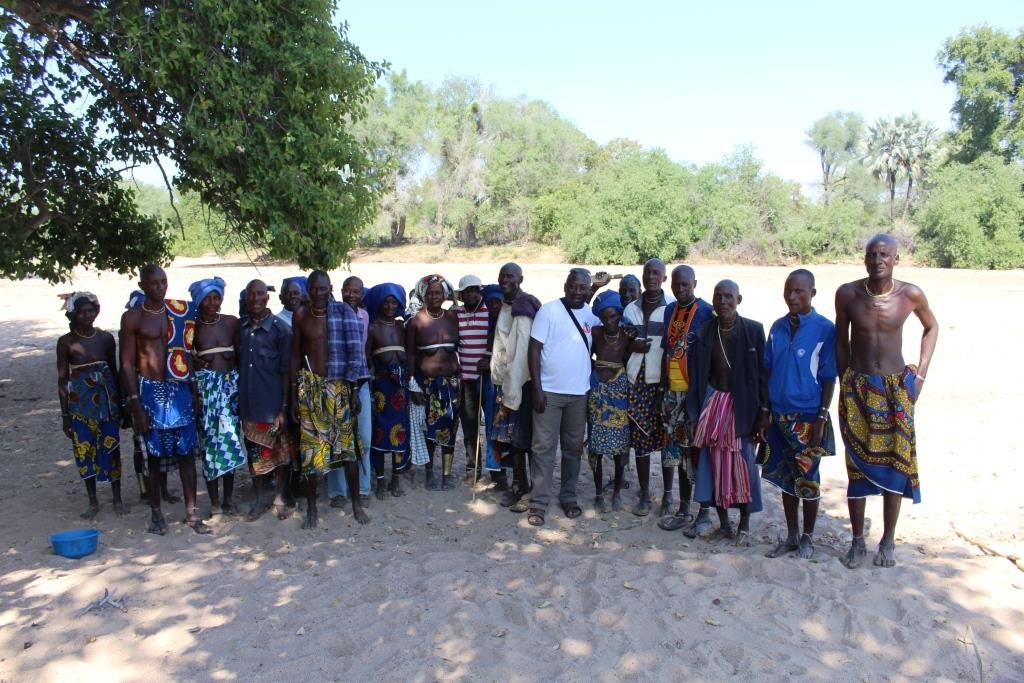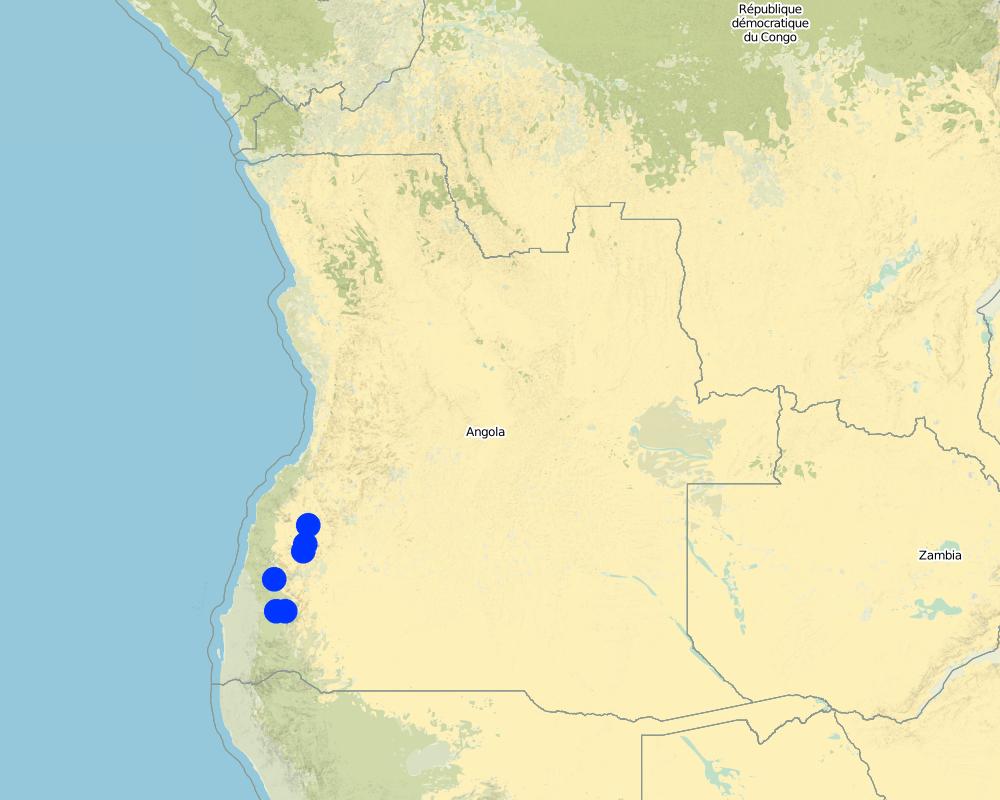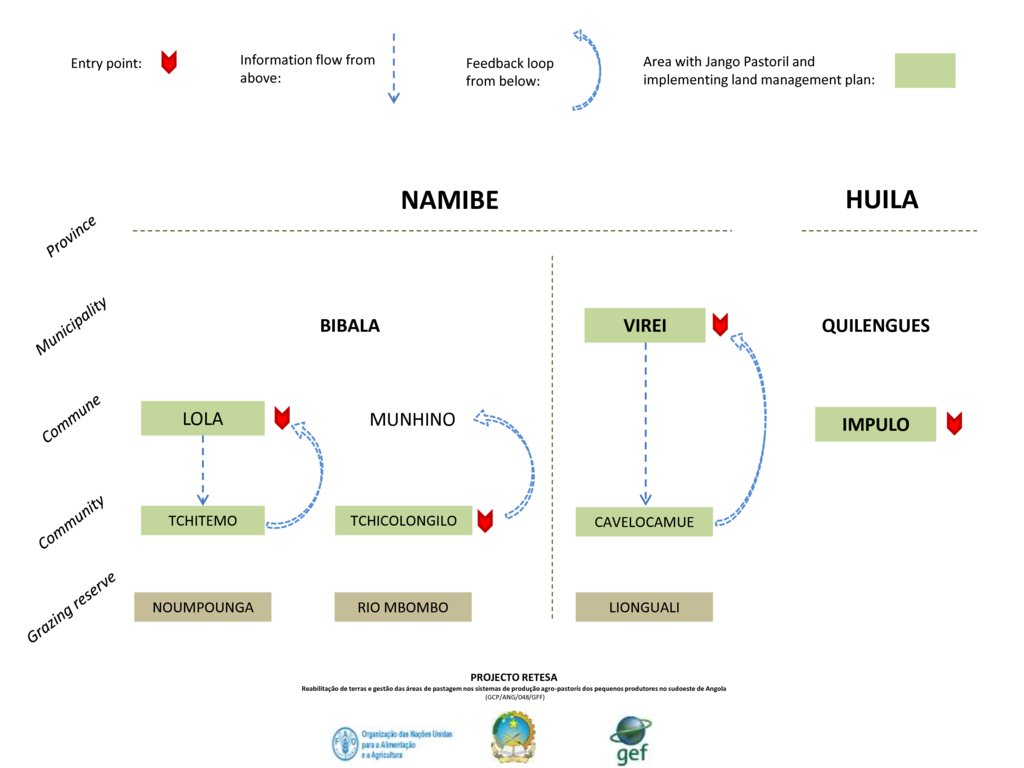Restoration of traditional pastoral management forums [Angola]
- Création :
- Mise à jour :
- Compilateur : Nicholas Euan Sharpe
- Rédacteurs : David Tarrason, Txaran Basterrechea
- Examinateur : Rima Mekdaschi Studer
Jangos Pastoris
approaches_3173 - Angola
- Résumé complet en PDF
- Résumé complet en PDF pour impression
- Résumé complet dans le navigateur
- Résumé complet (non formaté)
- Restoration of traditional pastoral management forums: 29 janvier 2018 (inactive)
- Restoration of traditional pastoral management forums: 16 février 2018 (inactive)
- Restauration des forums traditionnels de gestion pastorale: 12 juillet 2018 (inactive)
- Restauration des forums traditionnels de gestion pastorale: 2 novembre 2021 (public)
Voir les sections
Développer tout Réduire tout1. Informations générales
1.2 Coordonnées des personnes-ressources et des institutions impliquées dans l'évaluation et la documentation de l'Approche
Spécialiste GDT:
Nom du projet qui a facilité la documentation/ l'évaluation de l'Approche (si pertinent)
Reabilitação de terras e gestão das áreas de pastagem nos sistemas de produção agro-pastoris dos pequenos produtores no sudoeste de Angola (RETESA)Nom du ou des institutions qui ont facilité la documentation/ l'évaluation de l'Approche (si pertinent)
FAO Angola (FAO Angola) - Angola1.3 Conditions relatives à l'utilisation par WOCAT des données documentées
Quand les données ont-elles été compilées (sur le terrain)?
21/12/2017
Le compilateur et la(les) personne(s) ressource(s) acceptent les conditions relatives à l'utilisation par WOCAT des données documentées:
Oui
2. Description de l'Approche de GDT
2.1 Courte description de l'Approche
The transhumance pastoral communities of Southern Angola traditionally held gatherings of chieftains and community leaders to discuss and manage commonly held pastoral resources; however, the conflicts of the last century led to the breakdown in traditional governance and the majority of the traditional management systems were abandoned. The RETESA Project has supported their recovery as a way to reduce land degradation and improve local livelihoods.
2.2 Description détaillée de l'Approche
Description détaillée de l'Approche:
The Approach was developed and implemented through the RETESA Project “Land rehabilitation and rangelands management in smallholders agro-pastoral production systems in south western Angola”, which is a project owned and implemented by the Ministry of Environment of the Government of Angola with technical and methodological assistance from The Food and Agriculture Organization of the United Nations (FAO) and financed by the Global Environmental Found (GEF).
From an early stage, the RETESA Project identified 'management' as the most effective tool to improve pastoral livelihoods and to reduce land degradation over large areas of land. However, the management terms and concepts used in conventional western cultures were difficult to convey to the pastoral communities and communication of the needs and methods of proper grazing management were not fully understood and led to confusion. After struggling initially with these challenges, the project technicians responsible for rangeland improvement and rehabilitation began the investigate the traditional management systems in place before the armed conflicts took place and found that they adapted to modern rangeland management theory and practice and had a rich vocabulary which described in detail the timing and movements of the herds. Rather than teach a new way of viewing the natural world, the project's objective became one of reinstitutionalising these lost systems and recuperating what was in the communities' words 'the ways of our elders'. In order to provide an underlying methodological basis which guided the process, the Green Negotiated Territorial Development (GreeNTD) methodology was introduced and used to negotiate the terms and agreements of the 6 management plans created and implemented through the process.
In essence, the role of the traditional management systems was to keep the animals in more remote, mountainous areas during the rainy season, the only time of year when water is available in these areas, and slowly bring them back to the lowland, river plains during the dry season. This simple system also allowed for rangeland recovery and rest and for agriculture to be practiced on the lowlands during the rainy season without the threat of intrusion by livestock, something which is a constant source of conflict within the communities. The periods of 'recovery and rest' of the different areas also meant that important grasses and forage plants could grow, produce seed and multiply, something which was not occurring under previous management, where the animals were free to roam where they wished, returning to the same areas day after day and reducing ground cover to a bare minimum.
The modern discussion forums, or 'Jangos', are still traditional affairs run by traditional authorities and representatives from the communities, but they have adapted to include local Administrations and their technicians, as well as veterinarians, church leaders, NGOs, ranchers and farmers, so as to involve a broader range of stakeholders. The addition of these stakeholders and their involvement and approval of the decisions that come out of the forums are seen as key to the survival and effectiveness of the management plans implemented.
2.3 Photos de l'approche
2.5 Pays/ région/ lieux où l'Approche a été appliquée
Pays:
Angola
Région/ Etat/ Province:
Province of Namibe and Huila
Autres spécifications du lieu :
Municipalities of Bibala, Virei and Quilengues
Map
×2.6 Dates de début et de fin de l'Approche
Indiquez l'année de démarrage:
2015
Si l'année précise est inconnue, indiquez approximativement quand l'Approche a démarré:
il y a moins de 10 ans (récemment)
Commentaires:
The Project held its first Jango in December of 2015 and a total of 14 Jangos had been celebrated by the end of the project in April 2018.
2.7 Type d'Approche
- The approach relies on a combination of Traditional Inputs and the RETESA Project support
2.8 Principaux objectifs de l'Approche
Establish Jango Pastoril as institutions in strategic areas and use GreeNTD methodology to develop and implement 6 natural resource management plans that address the causes of land degradation and improve production and local livelihoods.
2.9 Conditions favorisant ou entravant la mise en œuvre de la(des) Technologie(s) appliquée(s) sous l'Approche
normes et valeurs sociales/ culturelles/ religieuses
- favorise
There is a clear understanding of the benefits of recuperating the traditional social structures and management systems.
- entrave
Current cultural norms and socio-polictical systems hinder the recuperation of the traditional systems as they originally were; therefore, adaptations should be made to make them viable under current conditions.
disponibilité/ accès aux ressources et services financiers
- entrave
The project ends in April 2018, whereby the Jangos must be self-sufficient and self-operating. Given the current economic crisis, this will be a challenge.
cadre institutionnel
- favorise
Most of the Municipal governments and community leaders involved have invested in the approach and wish to continue with the forums.
- entrave
Pastoral, nomadic livestyles are seen as a threat to education and prosperity by some institutions operating in the country, and the forums could be seen as a way of preserving pastoral culture.
collaboration/ coordination des acteurs
- favorise
The pastoral communities are fully aware of the land degradation and challenges they face and see the Jango Pastoril forums as a way to address these challenges.
- entrave
Communication has improved through the forum structure, though collaboration within communities for common benefit is still on the whole uncommon and could threaten the sustainability of the plans agreed upon by the forums. Some communities also fear that improvements in land productivity or infrastructure could lead to land being seized by more powerful actors.
cadre juridique (régime foncier, droits d'utilisation des terres et de l'eau)
- entrave
Land and water rights were not addressed during the forums and are still unclear in the majority of places these forums are operating. The land management plans were based on maintaining the 'status quo' currently operating in the area.
cadre politique
- favorise
The RETESA Project has succeeded in presenting traditional livestock management and transhumance movements in a positive light and is working with the Angolan Government to improve policies directed at livestock and herder movement throughout the transhumance migration routes, at community, regional and national levels.
- entrave
Pastoral cultures are still seen by many in power as a threat to education and economic prosperity.
gouvernance foncière (prise de décisions, mise en œuvre et application des décisions)
- entrave
There still remains much to be done in the area of Land Goverance, from decision-making, implementation and especially enforcement.
connaissances sur la GDT, accès aux supports techniques
- entrave
Very little is known about SLM and technical support is lacking at a community and municipal levels.
marchés (pour acheter les intrants, vendre les produits) et prix
- entrave
The more traditional tribes rarely sell their animals to local markets, leading critics to claim that their way of life contributes little to the local or national economies.
charge de travail, disponibilité de la main-d'œuvre
- favorise
There is a vast pool of young people able to work.
- entrave
Manual labour is most often carried out by the women of the family, while those under 18 are responsible for caring for the animals and following them on their daily search for pasture and water.
3. Participation et rôles des parties prenantes impliquées dans l'Approche
3.1 Parties prenantes impliquées dans l'Approche et rôles
- exploitants locaux des terres / communautés locales
Originally it was just the community chiefs and respected livestock producers who took part in the Jango Pastoril meetings, though the modern version also includes Administrators and their staff, Administrative technicians, veterinarians, ranchers, church leaders, NGOs and farmers.
Given that its the local land users and communities who manage the land on a daily basis, it is their role to fully understand the issues being debated and how the new management plans will affect them. This is usually done through a community Jango Pastoril forum run by the Project and traditional leaders who participate in the Municipal Forums, with the support of the local Administrations. In the community Jango Pastoril, the decisions taken at a Muncipal level are presented, opinions are expressed and the plans are modified or agreed upon. Community feedback is then presented by the traditional leaders at the next Municipal Jango Pastoril where it is recorded and taken into consideration, with the necessary adaptations being introduced.
- organisations communautaires
Agropastoral Farmer Field School (APFS) Facilitatores and Members.
Representatives from the Agricultural Development Iniciatives.
Local Church Representatives.
The community based organisations participate in the discussions and speak for those they represent. Many times they are often the ones who support the Administrations in the communication or implementation of the decisions made in the forums.
- Spécialistes de la GDT/ conseillers agricoles
FAO national and international Consultants.
Administrative agricultural and livestock technicians
Veterinarians and Animal Health Workers.
Provide technical support to discussions and provide feedback on local issues.
- ONG
Local and National NGOs.
Their role will most likely depend on the objectives of the participant NGO, but often lines of collaboration are easily established.
- secteur privé
Representitives from local ranches and private holdings.
Often the owners are far from the land, and send their local managers to participate, though they have often have little decision-making capacity. However, their presence and opinion should be sought.
- gouvernement local
Municipal and Communal Administrations and their representittives.
Co-coordinate the organisation and logistics of the Jango Pastoril forums. Participate as a stakeholder in the meetings and give feedback and administrative approval of the decisions taken. The Municipal and Communal Administrations usually have the final word on any decisions made so they must actively participate in the meetings.
- organisation internationale
Project 'RETESA', FAO Angola.
FAO Angola was responsible for supporting the Angolan Government in its design and execution of the Global Environment Funded 'Project RETESA'.
Si plusieurs parties prenantes sont impliquées, indiquez l'organisme chef de file ou l'institution responsable:
Project 'RETESA', FAO Angola was the lead agency, though plans are for the Municipal Forums to be self-suficient in 2018.
3.2 Participation des exploitants locaux des terres/ communautés locales aux différentes phases de l'Approche
| Participation des exploitants locaux des terres/ communautés locales | Spécifiez qui était impliqué et décrivez les activités | |
|---|---|---|
| initiation/ motivation | interactive | The first meetings and forums were organised by the Municipal Administrations and the Retesa Project, picking up from previous attempts at organising discussion forums to manage commonly held natural resources. |
| planification | interactive | Once Jango Pastoril were well established, the decision making process was transferred to them, with technical support being provided by the SLM specialists and with the Municipal Administrators having final word. |
| mise en œuvre | interactive | The implementation of the decisions made was based on their type and complexity and often depended on input and action from various stakeholders. Where possible, external support in the form of technical knowledge, materials, food, machinery, etc. were organised to support the agreed upon activities and works. |
| suivi/ évaluation | soutien extérieur | At the current stage, monitoring and evaluation has been carried out by the RETESA Project and the supporting Administrations. In the best case scenario, monitoring and evaluation would be carried out by the Jango Pastoril themselves, though external support would most likely be needed, at least until the process is well understood by the forum participants. |
3.3 Diagramme/ organigramme (si disponible)
Description:
As the initial processes had different entry points and acted at different administrative levels, a graphic representation of the process can be seen in the flow chart provided. Readers are asked to focus on the entry points and how each situation developed, rather than focus on the specific names of the areas.
The Approach has overseen the creation of 5 Jango Pastoril, each with their own contexts and stakeholders, which are highlighted in the flow chart in green. By introducing and implementing the GreeNTD methodology, the 5 Jango Pastoril also debated and approved land management plans with administrative and community support, which in some cases allowed for the creation of large grazing reserves. The 6th and final plan is the combination of the 5 plans into an encompassing plan which serves a large part of the principal transhumance migration route.
Auteur:
Projecto RETESA 2018
3.4 Prises de décision pour la sélection de la Technologie/ des Technologies
Indiquez qui a décidé de la sélection de la Technologie/ des Technologies à mettre en œuvre:
- tous les acteurs concernés dans le cadre d'une approche participative
Expliquez:
FAO representatives facilitated the Forums, though decision-making and proposals came largely from the Forum participants themselves. SLM specialists did make clear their opinions and helped the group reach viable decisions on the use and adequacy of the technologies to be implemented.
Spécifiez sur quelle base ont été prises les décisions:
- expériences et opinions personnelles (non documentées)
- The traditional management system used before the conflicts of the XX century provided important inputs to the final land management plans.
4. Soutien technique, renforcement des capacités et gestion des connaissances
4.1 Renforcement des capacités/ formation
Une formation a-t-elle été dispensée aux exploitants des terres/ autres parties prenantes?
Oui
- Forum participants
Si pertinent, spécifiez le genre, l'âge, le statut, l'ethnie, etc.
Principaly male (livestock is male centred enterprise in the area, except for chickens and pigs), 40 to 60 years of age, leader/authority within the community and their is generally a mix of tribal backgrounds. Administrative representatives were more variable in gender, background and ethnicity.
Formats de la formation:
- réunions publiques
Thèmes abordés:
Animal health and nutrition; native pasture and rangeland management; water management & illnesses (both human and animal); integrated landscape design and planning; development and governance of Community Management Forums.
Commentaires:
The first 2 Forums celebrated in each area opened with 2 hours of training and education. After the trainings sessions, the current livestock and rangeland management model was discussed and the members of the Forum proposed different ways of adapting current management to improve both grassland/rangeland health, as well as addressing current social conflicts arising from animal production issues (children not attending school to care for animals; livestock invading agricultural crops; animal theft; lack of administrative support). The following Forum sessions do not usually include training, but centre on consolidating previous agreements, developing management plans and assigning task to be carried out, with supervision from local authorities and Municipal representitives.
4.2 Service de conseils
Les exploitants des terres ont-ils accès à un service de conseils?
Oui
Spécifiez si le service de conseils est fourni:
- dans les champs des exploitants?
Décrivez/ commentez:
The Jango Pastoril have a limited ability to provide advisory services, but they can be used by participants to find and meet those who can provide assistance.
4.3 Renforcement des institutions (développement organisationnel)
Des institutions ont elles été mises en place ou renforcées par le biais de l'Approche?
- oui, modérément
Spécifiez à quel(s) niveau(x), ces institutions ont été renforcées ou mises en place:
- local
Décrivez l'institution, ses rôles et responsabilités, ses membres, etc.
Creation of the Jango Pastoril as an institution in its own right has led to important benefits. Local, communal and municipal institutions have also been strengthened and provided with a direct link to the pastoral communities.
Précisez le type de soutien:
- renforcement des capacités/ formation
Donnez plus de détails:
The Jango Pastoril approach, underlain with the GreeNTD Methodology, stands as an example for involving locals in decision-making processes around commonly held natural resources. Local and Municipal authorities have benefited by experiencing and overseeing much of the process.
4.4 Suivi et évaluation
Le suivi et l'évaluation font ils partie de l'Approche? :
Oui
Commentaires:
The idea is that the regurally scheduled Jango Pastoril are to act as monitoring bodies for the land management plans, evaluating results and taking action to correct mistakes or adapt to new conditions. However, for the most part it will be the Muncipal authorities who decide whether the process is working and whether to continue with them or not.
Si oui, ce document est-il destiné à être utilisé pour le suivi et l'évaluation?
Non
4.5 Recherche
La recherche a-t-elle fait partie intégrante de l’Approche?
Non
5. Financement et soutien matériel externe
5.1 Budget annuel de la composante GDT de l'Approche
Indiquez le budget annuel de la composante GDT de l'Approche en $ US:
2200,00
Si le budget annuel précis n'est pas connu, indiquez une fourchette:
- < 2 000
Commentez (par ex. principales sources de financement/ principaux bailleurs de fonds):
It costs about US $500 to organise and fund a Muncipal Forum, about US $200 for a Community Forum. Theoretically, their should be around 2 Muncipal Forums and 6 Community Forums per year per Municipality.
5.2 Soutiens financiers/ matériels fournis aux exploitants des terres
Les exploitants des terres ont-ils reçu un soutien financier/ matériel pour la mise en œuvre de la Technologie/ des Technologies?
Non
5.3 Subventions pour des intrants spécifiques (incluant la main d'œuvre)
- aucun
Si la main d'œuvre fournie par les exploitants des terres était un intrant substantiel, elle était:
- volontaire
Commentaires:
Breakfast, Lunch and Drinks were provided by the Project RETESA during the Municipal Forums (as many had travelled far to attend). Breakfast and Drinks were provided at the Community Forums by the Project.
5.4 Crédits
Des crédits ont-ils été alloués à travers l'Approche pour les activités de GDT?
Non
5.5 Autres incitations ou instruments
D'autres incitations ou instruments ont-ils été utilisés pour promouvoir la mise en œuvre des Technologies de GDT?
Non
6. Analyses d'impact et conclusions
6.1 Impacts de l'Approche
Est-ce que l'Approche a autonomisé les exploitants locaux des terres, amélioré la participation des parties prenantes?
- Non
- Oui, un peu
- Oui, modérément
- Oui, beaucoup
In most cases, there are no community forums or public spaces for locals to voice their opinions. By creating the Jango Pastoril forums, participant land users and their representatives were able to voice their concerns and propose solutions.
Est-ce que l'Approche a permis la prise de décisions fondées sur des données probantes?
- Non
- Oui, un peu
- Oui, modérément
- Oui, beaucoup
Experience in the area has shown that presenting 'scientific evidence' to communities with little formal education can produce interesting interpretations and consequences. Most decisions in pastoral communities are based on past experience, social convenctions and emotions. However there is significant collective memory that has allowed for the evidence of land degradation and climate change to become clear and better decisions are being made.
Est-ce que l'Approche a aidé les exploitants des terres à mettre en œuvre et entretenir les Technologies de GDT?
- Non
- Oui, un peu
- Oui, modérément
- Oui, beaucoup
yes, the approach did help land users implement and improve upon current practices. However, the Jango Pastoril forums were not created as a purely educational environment and they depended on the participants having enough experience and knowledge to provide adequate feedback and make proper decisions.
Est-ce que l'Approche a amélioré la coordination et la mise en œuvre de la GDT selon un bon rapport coût-efficacité?
- Non
- Oui, un peu
- Oui, modérément
- Oui, beaucoup
Coordination was improved at various public and administrative levels, though the forums as an institution are still in their ealry stage.
Est-ce que l'Approche a mobilisé/ amélioré l'accès aux ressources financières pour la mise en œuvre de la GDT?
- Non
- Oui, un peu
- Oui, modérément
- Oui, beaucoup
Funding has been sought for water point improvement works yet none has materialised to date.
Est-ce que l'Approche a amélioré les connaissances et les capacités des exploitants des terres pour mettre en œuvre la GDT?
- Non
- Oui, un peu
- Oui, modérément
- Oui, beaucoup
As the first Jango Pastoril forums in each area did include 2 hours of education on proper rangeland and natural resource management, some knowledge and capacity building was part of the process.
Est-ce que l'Approche a amélioré les connaissances et les capacités des autres parties prenantes?
- Non
- Oui, un peu
- Oui, modérément
- Oui, beaucoup
The exchange of points of view and communication between the different stakeholders improved the collective knowledge of traditional production systems and the challenges each group faces.
Est-ce que l'Approche a construit/ renforcé les institutions, la collaboration entre parties prenantes?
- Non
- Oui, un peu
- Oui, modérément
- Oui, beaucoup
The Jango Pastoril forums were the first organised events that brought these different stakeholders to the table to discuss key issues surrounding commonly held natural resources.
Est-ce que l'Approche a atténué les conflits?
- Non
- Oui, un peu
- Oui, modérément
- Oui, beaucoup
The Jango Pastoril discussed and dealt with various sources of conflict in the local areas where they were held. In some cases, solutions were found and agreed upon; however, some conflicts were best left in the hands of the relevant authorities, though suggestions and proposals were gathered and presented to Administrative authorities present.
Est-ce que l'Approche a autonomisé les groupes socialement et économiquement défavorisés?
- Non
- Oui, un peu
- Oui, modérément
- Oui, beaucoup
Pastoral herders often enjoy a certain amount of standing within their communities and the majority of the participants were elder male members of the communities. Women farmers and widows were often invited but were overall under-represented in the forums. This is clearly an area of improvement for future interventions.
Est-ce que l'Approche a amélioré l'égalité entre hommes et femmes et autonomisé les femmes et les filles?
- Non
- Oui, un peu
- Oui, modérément
- Oui, beaucoup
Although a number of women hold high positions within the Provincial and Municipal governments and took part in the forum discussions as administrative representives, for the most part the participants in the forums were elderly men of standing.
Est-ce que l'Approche a encouragé les jeunes/ la prochaine génération d'exploitants des terres à s'engager dans la GDT?
- Non
- Oui, un peu
- Oui, modérément
- Oui, beaucoup
A small percentage of young males took part in the forums. As they mostly care for the livestock, it would be good to improve their participation rates in future events.
Est-ce que l'Approche a amélioré les questions foncières et des droits d'utilisation qui entravent la mise en œuvre des Technologies?
- Non
- Oui, un peu
- Oui, modérément
- Oui, beaucoup
Land rights and tenure were not addressed either by the forums or the Project. The land management plans created and implemented maintained the 'status quo' currently operating in the area.
Est-ce que l'Approche a conduit à améliorer la sécurité alimentaire et/ou la nutrition?
- Non
- Oui, un peu
- Oui, modérément
- Oui, beaucoup
The land management plans should produce improved animal production rates and reduce livestock invasions of crops, leading to improved food security and nutrition.
Est-ce que l'Approche a amélioré l'accès aux marchés?
- Non
- Oui, un peu
- Oui, modérément
- Oui, beaucoup
Sale of animals is still a sensitive issue in the area and this topic did not form part of the discussions.
Est-ce que l'Approche a conduit à améliorer l'accès à l'eau et l'assainissement?
- Non
- Oui, un peu
- Oui, modérément
- Oui, beaucoup
Water harvesting and access was a common topic and a list of priority areas and works was prepared and presented to Communal and Municipal Administrations, leading to a number of access and storage improvement activities.
Est-ce que l'Approche a conduit à l'utilisation/ sources d'énergie plus durables?
- Non
- Oui, un peu
- Oui, modérément
- Oui, beaucoup
Charcoal production and its effects on the area was raised and debated a number of times but no agreements or solutions were found.
Est-ce que l'Approche a amélioré la capacité des exploitants des terres à s'adapter aux changements/ extrêmes climatiques et a atténué les catastrophes liées au climat?
- Non
- Oui, un peu
- Oui, modérément
- Oui, beaucoup
The creation of large scale grazing reserves and institutions that allow for debate and adaptation of management to increasing changes should lead to an improved capacity to adapt to changes in the climate.
Est-ce que l'Approche a conduit à des emplois, des opportunités de revenus?
- Non
- Oui, un peu
- Oui, modérément
- Oui, beaucoup
6.2 Principale motivation des exploitants des terres pour mettre en œuvre la GDT
- augmenter la production
Recuperating large grazing reserves and planning animal movements to allow for rangeland recovery and growth will bring about increased production. What remains to be seen is if the managment plans are respected and enforced.
- réduire la dégradation des terres
Improper livestock management is the leading cause of land degradation in the area and the Jango Pastoril and the managment plans created deal directly with this problem.
- coutumes et croyances, morale
By reinstating the traditional systems, support and understanding for the 5 land management plans was easily appropriated and communicated. The adaptation of the Jango Pastoril to its modern form was also appropriated with ease.
- atténuer les conflits
The Impulo management plan dealt directly with 2 conflicts that were of concern to the local communities, which were invasion of crops by livestock, the closing of the traditional water point access points by new cropping land. The plan created was more an communal ordinance and required that livestock be accompanied by a herder during the day and corraled at night and that those who encroached on traditional livestock routes and water access points would be given 1 growing season to open the routes and access points.
6.3 Durabilité des activités de l'Approche
Les exploitants des terres peuvent-ils poursuivre ce qui a été mis en œuvre par le biais de l'Approche (sans soutien extérieur)?
- oui
Si oui, décrivez de quelle manière:
Given coordination and willingness, the communities and Administrations have the resources needed to continue on with Approach as it has been , albeit without the technical and logistical support given by the project until this point. In any case, the process has shown to be well appropriated.
6.4 Points forts/ avantages de l'Approche
| Points forts/ avantages/ possibilités du point de vue de l'exploitant des terres |
|---|
| Through the Jango Pastoril, land users now have available an instrument to voice opinions and bring attention to issues affecting pastoral communities and the natural resources they depend on. |
| It brings people in contact with decision-makers and others who play important roles in community affairs. |
| The Jango Pastoril also serve as a source of information, for example, information on water and pasture availability, on livestock theft, on the Administrations point of view on key issues and priorities, on new projects or programmes coming into the area, etc. |
| Points forts/ avantages/ possibilités du point de vue du compilateur ou d'une autre personne ressource clé |
|---|
| The Jango Pastoril brings together a diverse and important group of stakeholders who normally wouldn't meet with the objective of addressing rangeland management and livestock issues. In doing so, it brings attention to a number of serious problems affecting the base of local livelihoods and promotes understanding and collaboration between those present and the communites they represent. |
| It is one of the few ways to directly deal with the root cause of land degradation, which in this case is the cause is poor land management. It was management processes which produced the land degradation, and land management should be the tool used to address the problems. The land management plans created through the Jango Pastoril hopefully return things to a process by which the land was productive and supported a wide array of life. |
| It creates an institution whose formalities and objectives are easily understood and appropriated by locals. This institution deals with issues that are of a common concern and that should be receiving more attention than they are. |
| The Jango Pastoril and the commonly agreed land management plans they produced add weight to the argument for maintaining the commons for public use and grazing. By entering into agreements and producing management plans that improve local resources, the communities can show unity and argue against those that want to divide and privatise land in the area. |
6.5 Faiblesses/ inconvénients de l'Approche et moyens de les surmonter
| Faiblesses/ inconvénients/ risques du point de vue de l’exploitant des terres | Comment peuvent-ils être surmontés? |
|---|---|
| It can require a lengthy trip and an overnight stay for participants that have to travel from isolated communities. | The Jangos were scheduled at the same time as other key events and meetings, so as to reduce costs and travel. The Municipal and Communal Administrations usually found accomodation for those that had to stay the night. |
| The issues discussed and decisions made will have outcomes that will affect some land users. Obviously, there are those that are benefiting from the current situation and they will try and ensure that things remain as they are. | The GreeNTD methodology discussed earlier has a well established system for involving all stakeholders, assessing their motivations and publically producing a viable plan that addresses key issues. |
| The withdrawal of logistical and technical support by the RETESA Project will affect the Jango Pastoril forums. | Approach other projects coming into the area and find other funding opportunities to continue to support the growth of the forums. |
| Faiblesses/ inconvénients/ risques du point de vue du compilateur ou d'une autre personne ressource clé | Comment peuvent-ils être surmontés? |
|---|---|
| The Jango Pastoril do little to improver the situation of the disadvantaged members of the population, or to improve gender equality. In other words, they perpetuate current cultural power bases. | Explore ways with the Jangos of bringing in more farmers and women into the discussions. Or create 'Jango Campones' which deal with cropping issues and land rights. |
| The Jango Pastoril do little to address land ownship issues or land rights. | It should be the Jango that asks for help on this issue, but the Jango Pastoril have proven to be in favour of the rangelands being open and available for community grazing. |
| Enforcement of laws and regulations is not always easy in such isolated territory. | Establish protocols and systems for dealing with offenders that are known to the local authorities and support all attempts to communicate the plans to land users and invite their feedback. |
7. Références et liens
7.1 Méthodes/ sources d'information
- visites de terrain, enquêtes sur le terrain
- interviews/entretiens avec les exploitants des terres
7.3 Liens vers les informations pertinentes disponibles en ligne
Titre/ description:
FAO in Action: Using indigenous knowledge to reverse land degradation in Angola.
URL:
http://www.fao.org/in-action/using-indigenous-knowledge-to-reverse-land-degradation-in-angola/en/
Liens et modules
Développer tout Réduire toutLiens
Aucun lien
Modules
Aucun module trouvé


